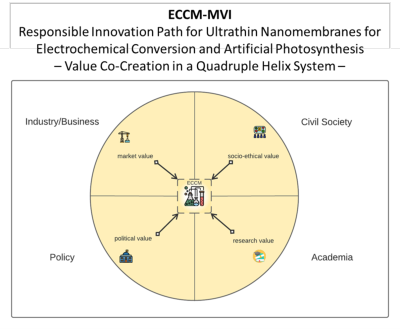Granted NWO ECCM MVI Top-up call to Dr. Georgios Katsoukis
The NWO ECCM/MVI top-up has been granted to the ECCM tenure track researcher Georgios Katsoukis who teams up with Cornelius Schubert from the Department of Science, Technology, and Policy Studies (STePS) at UTwente, Vincent Blok from the Management Studies and Philosophy Chair group at University of Wageningen, and Eugen Popa, expert in responsible innovation who will execute the work. The 3-year project starts in September 2021.
We observe that electrolyzer design has become locked-in on a dominant blueprint, i.e. membrane electrode assembly, through decades of scaling and optimization in research and industry, which has led to significant reduction of cost and risk for known concepts. However, this lock-in restricts technical innovation for increasing electrolyzer productivity, because membrane thickness, which is a major bottleneck for achieving high product yields and conversion rates, cannot be reduced any more in this configuration.

Ultrathin nanomembranes can enable radically new and scalable approaches to storing solar energy, bypassing electricity and producing fuels directly from sunlight. This potential configuration is new to science, which Georgios is studying in his ECCM project. But it is also new to societal stakeholders, from industry, to politics and civil society, which inevitably leads to a high risk of remaining locked-in in established technologies, because of the vested interests by several stakeholders.
The ambition of our MVI top-up proposal is to address the missing connections between the relevant stakeholder groups by fostering a fruitful dialog on the plurality of values associated with the shift to ultrathin nanomembranes. We especially plan to explore the socio-ethical issues and opportunities together with the stakeholder groups to facilitate value absorption in the design of nanomembranes and to provide efficient and sustainable technological solutions for the transition to renewable energies.





